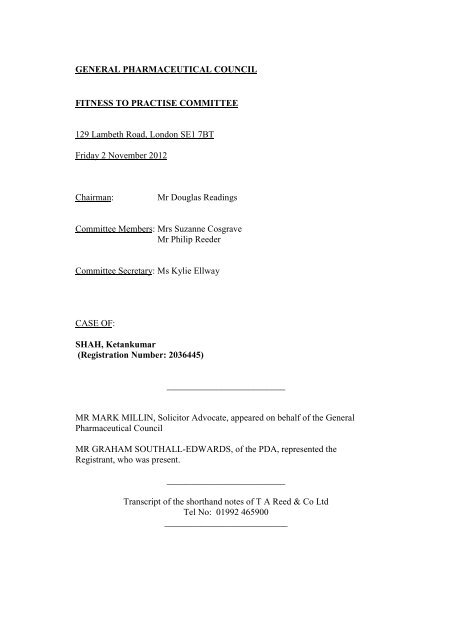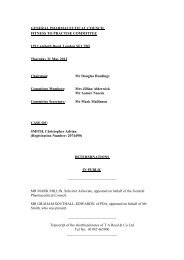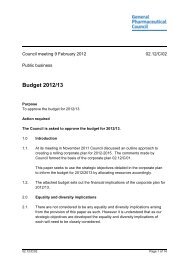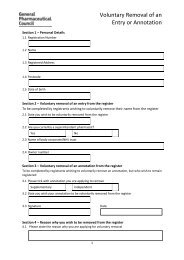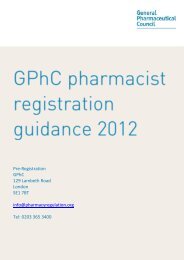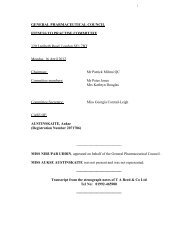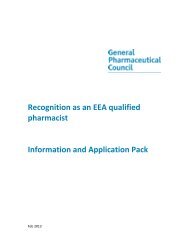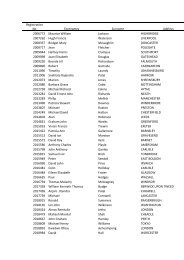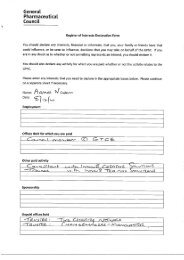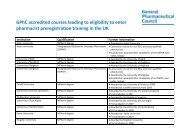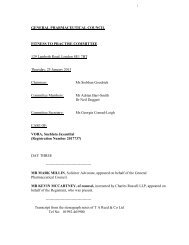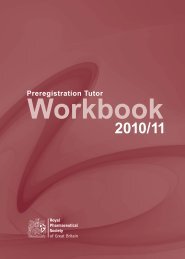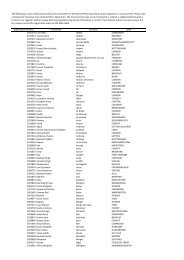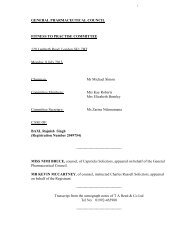Shah Ketankumar 2036445 5-11-2012.pdf - General ...
Shah Ketankumar 2036445 5-11-2012.pdf - General ...
Shah Ketankumar 2036445 5-11-2012.pdf - General ...
Create successful ePaper yourself
Turn your PDF publications into a flip-book with our unique Google optimized e-Paper software.
ABCthat a refund was paid in cash by a person operating a till at the Eastcote store who loggedin using Mr <strong>Shah</strong>’s PIN. Each transaction records the till operator as number 812. TheCouncil alleges that none of these transactions was genuine, no refund was paid to anycustomer, and they were all just a device by Mr <strong>Shah</strong> to create an apparent surplus of cashin the till, which he was able to remove, either then or later.The Committee heard from other members of staff at the Eastcote store, who gaveevidence in accordance with their witness statements. It was put to them on behalf ofMr <strong>Shah</strong> that although that was the company policy they did in fact know each other’sPIN numbers and they ought to change them if confidentiality was compromised, but thatin fact they did not. In the evidence that the staff actually gave they denied that theyknew each other’s PIN numbers. They also denied ever using Mr <strong>Shah</strong>’s PIN number.DIn respect of Particular 2 of the Allegation, the Committee considered separately each ofthe transactions listed in Schedule 1, which it numbered from 1 to <strong>11</strong> for ease ofreference, and the relevant documentation. It noted that there were some typographicalerrors in that Schedule:EFGIn number 1, the recorded times of the transaction were 9.54 and 9.57, not 9.57 and 10.00.In number 5, the date was 22 September 2005, not 2 November 2005.In number 6, the amount recorded as refunded was £27.90, not £33.89.In number 10, the amount recorded as refunded was £7.05, not £85.47.In each case, the documents record the transaction as being a cash refund carried out by812. In each case the Council alleges that the refund closely follows a correspondinggenuine sale. In several cases, there is a recorded sale in the same amount as the refundwhich occurs within a matter of minutes before the refund, sometimes so closely that it isrecorded as occurring within the same minute. In several cases the amounts are such as tosuggest that the sale and refund correspond. Each of the sales which is alleged tocorrespond is a credit card sale, and company policy was that refunds should be given bythe same method, i.e. by credit card, not in cash.HT A REED& CO LTD01992-465900On Mr <strong>Shah</strong>’s behalf it has been pointed out that in some cases the time is not so close,such as number <strong>11</strong> (transactions 368 and 382 on 24 November 2005) where the sale5- Day 6
ABCDEFwhich is alleged to correspond with the refund occurred more than an hour previously. Inevery case, Mr Edwards on behalf of Mr <strong>Shah</strong> has argued that there was the possibilitythat another member of staff might have used Mr <strong>Shah</strong>’s PIN without his knowledge. Hehas pointed out that the touch screen number pad on the tills was quite big, and oneperson could look over another’s shoulder to see the PIN being entered.The Committee finds Particular of Allegation 2 proved in its entirety. The only personwho has suggested that one member of staff might know another’s PIN number isMr <strong>Shah</strong> himself. Not every member of staff was called to give evidence, but those whowere, denied knowing the PIN numbers of other members of staff, although some wereprepared to accept that it was theoretically possible to look over somebody else’sshoulder and see a PIN number being entered if one wanted to do so. None of them hadany experience of this actually happening. The Committee accepts that they were tellingthe truth. Furthermore, the Committee rejects Mr <strong>Shah</strong>’s suggestion that anybody elseused his PIN number. He told the Committee that he regularly used the tills to record asmany as 200 transactions per day. Yet he did not tell the Committee about any occasionof being locked out of the tills because somebody else was already logged on with hisPIN number. This would have been likely to occur if somebody else had been regularlyusing his PIN. Mr <strong>Shah</strong> also suggested that there were frequent occasions when hestarted a transaction, using his PIN, and then he was called away, and left anothermember of staff to complete the transaction. The Committee rejects the suggestion that inthese circumstances a spurious refund transaction might have been recorded by somebodyelse, under Mr <strong>Shah</strong>’s PIN. The evidence of other members of staff, which theCommittee accepts as honest and more probable, is that in those circumstances thetransaction would be suspended, and another member of staff would take over, signing inwith his or her own PIN.GHT A REED& CO LTD01992-465900Another suggestion made on behalf of Mr <strong>Shah</strong> was that there might have been anothermember of staff, whom Mr Edwards described in argument as “villain number 602”. Atthe foot of the document on page 34 of the Bundle of Documents, there is a reference to atill transaction number 3624 carried out by an operator with that identifying three figurecode. It has been suggested that this unidentified person might be responsible for theincorrect transactions. The Committee rejects that suggestion. It notes that the6- Day 6
ABCDEFGHT A REED& CO LTD01992-465900transaction 3624 immediately follows the transaction 3623 which was carried out by anoperator with the code 812, Mr <strong>Shah</strong>’s code. The Committee has seen copies of the staffrotas for September, October and November 2005, and there is no additional member ofstaff there recorded with the code 602. On the balance of probabilities, 602 was somespare number used for administrative convenience. It was certainly not a possible villain.Mr Edwards has also pointed out that there is no positive evidence of any stockdiscrepancies arising at the Eastcote store, such as might be expected where refunds aredishonestly recorded after goods have been sold. The Committee notes, however, that therefunds in question were all recorded by reference to “group codes” or, as they havesometimes been called “dump codes”, which do not identify the specific items of stocksold or refunded. There is therefore no direct connection with stock records. There hasbeen no evidence concerning general stock reconciliations or deficiencies for the Eastcotestore. In particular, there is no evidence that stock balanced. The Committee notes thatthe receipts which ought to have been kept in respect of NHS refunds, if genuine, havenot been found. The Committee noted Mr <strong>Shah</strong>’s suggestion that he might occasionallyhave given a refund to a patient who intended to obtain a pre-payment certificate. TheCommittee rejects this as a wholly improbable and illogical suggestion.The Committee finds that each of the eleven transactions referred to in Schedule 1 wascarried out by Mr <strong>Shah</strong>, using his own PIN, and the refund in each case was not genuinei.e. no money was repaid to any customers in respect of any of those transactions. Someof those transactions are slightly different from the others, and the Committee hasconsidered each separately. For example, number 6, transaction 4623, might appear to bea genuine refund of part of the goods originally sold, but the records show the till wasopen for the refund for only two seconds. The Committee is satisfied that this was notenough time to enable £27.90 to be counted out in cash to a genuine customer. This ismirrored in a number of other transactions. Number 10, transaction 328 and 329, mightalso appear to be genuine at first sight, since the amount recorded as refunded was exactly10 per cent of the sale price. But the Committee has reflected on the transactions whichhave been proved, and has concluded that they demonstrate a pattern of opportunisticthefts. On the balance of probabilities, it is satisfied that Mr <strong>Shah</strong> took advantage of theopportunity to steal an amount which would look, to his employers, like a discount repaid7- Day 6
Ato a customer. The documents show that number <strong>11</strong> was immediately followed by a “nosale”, which gave the opportunity to take out of the till the money representing theaccumulated apparent surplus in the till.BCDParticular 3 of the Allegation refers to two similar refund transactions identified inSchedule 2. There is again a typographical error in Schedule 2, because the refund inrespect of the second transaction, number 649, was £38.50, not £38.52. The differencefrom the refunds in Schedule 1 is that the private prescriptions concerned have beenproduced in evidence. They were retained by the Eastcote store, whereas if there hadbeen a genuine refund they would have been returned to the patient. Furthermore, theprescriptions were recorded in the store’s Private Prescription Record Book, and notstruck out as they would have been if they had not been dispensed. This demonstratesbeyond any doubt whatsoever that the recorded refunds were not genuine. TheCommittee finds that Mr <strong>Shah</strong> made the relevant till entries, for the same reasons as inrespect of Particular of Allegation 2. Particular of Allegation 3 is found proved.EThe Committee considered Particular of Allegation 7 in relation to Particulars 2 and 3.The transactions concerned were plainly inappropriate. They were contrary to KeyResponsibility 3 of the Code of Ethics. The Committee applied the R v Ghosh test ofdishonesty, and concluded that Mr <strong>Shah</strong>’s actions were dishonest by the standards ofordinary and reasonable people, and he knew them to be dishonest by those standards.FGParticular of Allegation number 4 arises out of the evidence of a member of staffMs Sudha Patel, who told the Committee that on 28 November 2005 she saw Mr <strong>Shah</strong>complete a till transaction and then throw the till receipt and another piece of paper intothe dispensary bin. She said that she and Ms Aruna Sinhal waited until Mr <strong>Shah</strong> went outto lunch and then searched the bin and found a till receipt for a transaction completed byoperator 555. This was the code number of Ms Sinhal herself. They also found a piece ofpaper which had been put into the till and printed with the word “void” and Ms Sinhal’scode 555.HT A REED& CO LTD01992-465900When the Committee first retired to consider the allegations of fact, it noted thatParticular of Allegation 4 did not accurately reflect the transaction demonstrated by the8- Day 6
ABCDdocuments. The Committee therefore invited comments from the parties as to whether itwould be fair to amend the wording of this Particular of Allegation. Mr Edwards onMr <strong>Shah</strong>’s behalf suggested that it would be unfair to do so because the Council had notaccurately set out its allegation at the beginning of the case, and Mr <strong>Shah</strong>’s case mighthave been conducted differently if the amendment had been made at an earlier stage, andhe said it might be necessary to recall Ms Sinhal to cross-examine her further about thepurpose of putting a blank piece of paper in the till to “void it”. Mr Millin on behalf ofthe Council suggested that there was no unfairness in making the amendment, because thefacts had been thoroughly investigated in the course of the hearing. The Committee hashad the advantage of being able to consult a transcript of the earlier part of the hearing. Itnotes that on Wednesday <strong>11</strong> July 2012, which was Day 2 of this hearing, Ms Sinhal wascross-examined by Mr Edwards concerning this matter. The Committee was satisfied thatthere would be no unfairness in amending the Particular of Allegation 4, which willtherefore be amended to read as follows:“On or around 28 November 2005, using the PIN number of another member ofstaff, you completed a sale for £13.92, after which you voided a blank piece ofpaper in lieu of a voucher, and retained £10 in cash.”EFThe reason for this amendment is that the documents show the original sale was in theamount of £13.92, but it was entered on the till as being for £3.92 in cash and £10 by wayof voucher. No voucher has ever actually been found. The Council’s case was thatMr <strong>Shah</strong> made it look as if a voucher had been received by putting a piece of paper in thetill, and voiding it, as would have been done if there had been a voucher. The result wasthat the till contained a cash surplus of £10.GHT A REED& CO LTD01992-465900The Committee finds this Particular of Allegation proved, as amended. It has nohesitation in accepting the evidence of Ms Sinhal and Ms Patel, which is corroborated inall respects by the documents which appear in the Bundle at pages 142 to 145. It notesthat the staff at the store had started to be suspicious, and were therefore observingMr <strong>Shah</strong> carefully. When cross-examined on behalf of Mr <strong>Shah</strong>, Ms Sinhal described theway in which she learned what had happened, as follows: “I had seen him on the till,because on that last particular – on the Monday, he said to me, ‘You go in the pharmacyand get on with the scripts’, and he was going to be outside on the counter. So I left him9- Day 6
ABto it. Then Sue comes along and says she has found a receipt. She says, ‘Who has donethis?’ We ask her, ‘Whose number is it?’ She said ‘It is 555’. I said, ‘Well I haven’tdone it, because I’ve been in the dispensary. So somebody has used my number, while Iwas in the pharmacy’.”The only purpose of the transaction must have been to retain £10, and the Committeeinfers that Mr <strong>Shah</strong> did so. It notes that Boots at that time required vouchers to be sent tohead office periodically, but did not in fact attempt to check or reconcile vouchers.CThe Committee finds Particular 7 proved in relation to Particular of Allegation 4.DEFGHT A REED& CO LTD01992-465900Particulars of Allegation 5 concerns Mr and Mrs Hymans. Mr Hymans is a retired policeofficer, who gave evidence to the Committee which the Committee accepted as being inevery way accurate and truthful. Part of his evidence was corroborated bycontemporaneous notes. He said that on two occasions in 2004, he was served in thestore by Mr <strong>Shah</strong>, who accepted a £20 note, and short-changed him by giving him changefor a £10 note instead. When challenged, Mr <strong>Shah</strong> then gave him the further £10 due,without any query or hesitation. Mr <strong>Shah</strong> told the Committee that he must have made amistake, and he would always accept that the customer was right, and would pay over theextra change. The Committee heard detailed evidence about the way in which cash washandled at Boots stores at the relevant time, including the limits on the amounts of cash tobe retained in tills, and the way in which £20 notes were put separately into a countersafe, rather than the till. It is satisfied that if Mr <strong>Shah</strong> had made an innocent mistake, hewould have carried out a brief check on the cash in the till and might well have had toinvolve another member of staff, but he would not have simply handed over an additionalamount of £10 without question. His actions clearly proved that he had short-changedMr Hymans and knew he had done so. Particular of Allegation 5 is found proved, andParticular of Allegation 7 is found proved in its entirety in respect of Particular 5.Particular of Allegation 6 again concerns Mr Hymans. On 26 February 2006 he wasagain served by Mr <strong>Shah</strong> when he purchased a tube of cream for his own use at theEastcote store at a price of £5.49. He told the Committee that he paid in cash, butreceived no receipt and did not receive his change until he asked for it. At Mr <strong>Shah</strong>’s10- Day 6
ABCsuggestion he handed over his wife’s Boots Advantage Card, in order to have pointscredited to it. He later discovered that the purchase had been debited from the AdvantageCard, so that he had in effect paid twice. The Council’s allegation is that Mr <strong>Shah</strong> did notring up the cash sale on the till, and instead retained the sum of £5.49 himself.The Committee finds this Particular of Allegation proved. Mr <strong>Shah</strong> told the Committeethat he believed he must have made a mistake. He accepted, however, that whenMr Hymans complained to Boots about this transaction, he spoke to him on the telephone,and gave an explanation which he admitted was not true. He told Mr Hymans that the tillmight have become stuck in “redemption mode” and that he therefore accidentallydeducted the price of £5.49 from the Advantage Card instead of adding the loyalty points.The evidence was that, as Mr <strong>Shah</strong> knew, the tills did not operate in this way.DEFGHT A REED& CO LTD01992-465900The different suggestion which Mr <strong>Shah</strong> gave in his evidence to the Committee was thathe had misheard Mr Hymans as saying that he wished the purchase to be debited from theAdvantage Card, so that he first debited it, and then had to repeat the sale as a cashtransaction, but he forgot to reverse the Advantage Card transaction. The Committeedoes not accept that suggestion, because it does not account for the fact that Mr Hymansreceived no receipt, and is an improbable and impractical way of carrying out thetransaction in question. The Committee finds that Particular of Allegation 6 is provedand Particular of Allegation 7 is proved in its entirety in relation to it. It notes that this isanother instance of an opportunistic theft.Although it is not the subject of any specific allegation of fact, the Committee consideredthe circumstances of Mr <strong>Shah</strong>’s resignation from his employment, by letter on1 December 2005. Mr <strong>Shah</strong> told the Committee that his resignation was not connectedwith the fact that on the previous day the Area Loss Detection Managers had visited thestore. The Committee notes that when he returned to work on 30 November he madeenquiries about the reason for their visit. It notes that, although he subsequently claimedto have been injured at work on 30 November, he said nothing about that in his letter ofresignation. It notes that he said he had an opportunity which he had to take up by thebeginning of the New Year, but he did not in fact do so. It notes that he subsequently saidthat he felt under pressure of work, and referred in evidence to problems with “increasing<strong>11</strong>- Day 6
ABDuring that time Mr <strong>Shah</strong> has been working as a pharmacist, and the Committee has hadtestimonials, and direct oral evidence, to the effect that he has given complete satisfactionin practice to his employer and to patients. He has no other offences or misconductrecorded against him.In those circumstances, Mr Edwards on behalf of Mr <strong>Shah</strong> has suggested that, althoughhis fitness to practise was impaired in 2005 and 2006, the passage of time, and his goodconduct, demonstrates that Mr <strong>Shah</strong>’s fitness to practise is no longer impaired.CDThe Committee considers that Mr <strong>Shah</strong>’s misconduct is “egregious”, the word that wasused in the case of Cheatle v GMC [2009] EWHC 645 (Admin.). The Committee doubtswhether dishonesty of the extent and gravity of this case can be remedied by the passageof time. It notes that Mr <strong>Shah</strong>’s misconduct was not in respect of his clinical skills orpractice, so that the good testimonials presented are not relevant to the type of misconductconcerned.EFThe Committee has had regard to Rule 5 of the <strong>General</strong> Pharmaceutical Council (Fitnessto Practise and Disqualification etc. Rules) Order 2010 which specifies criteria forjudging whether fitness to practise is impaired. It is satisfied that Mr <strong>Shah</strong>’s behaviourhas brought the profession into disrepute, and that it has breached one of the fundamentalprinciples of the profession of pharmacy. For that proposition, it is necessary only torefer to Key Responsibility 3 from the Code of Ethics which is referred to in theParticulars of Allegation. The Code in force today is not substantially different.Mr <strong>Shah</strong>’s integrity can no longer be relied upon.GThe Committee has had regard to the observation of Mrs Justice Cox in the case of CHREv Nursing and Midwifery Council and Grant [20<strong>11</strong>] EWHC 927 (Admin):“In determining whether a practitioner’s fitness to practise is impaired by reasonof misconduct, the relevant panel should generally consider not only whether thepractitioner continues to present a risk to members of the public in his or hercurrent role, but also whether the need to uphold proper professional standardsand public confidence in the profession would be undermined if a finding ofimpairment were not made in the particular circumstances.”HT A REED& CO LTD01992-46590013- Day 6
ABHaving weighed all these matters, the Committee has decided that, on the facts of thepresent case, Mr <strong>Shah</strong>’s fitness to practise is currently impaired by reason of hismisconduct. The need to uphold professional standards and public confidence in theprofession would be undermined if a finding of impairment were not made in theparticular circumstances. That concludes the second of the three stages of proceedings.------------CGENERAL PHARMACEUTICAL COUNCILFITNESS TO PRACTISE COMMITTEE129 Lambeth Road, London SE1 7BTDMonday, 5 November 2012EChairman:Committee Members:Committee Secretary:Mr Douglas ReadingsMrs Suzanne CosgraveMr Philip ReederMr Mark MallinsonFCASE OF:SHAH, <strong>Ketankumar</strong>(Registration Number <strong>2036445</strong>)DAY SEVENG-------------------------------------MR MARK MILLIN, Solicitor Advocate, appeared on behalf of the <strong>General</strong>Pharmaceutical Council.MR GRAHAM SOUTHALL-EDWARDS, of the PDA, appeared on behalf of theRegistrant.HT A REED& CO LTD01992-465900-------------------------------------14- Day 6
AThe Committee next considered an order imposing conditions on the registrant'sregistration. Although this case is concerned with dishonesty in cash handling, there aremany other aspects of a pharmacists work which require honesty and integrity, so thatBconditions restricting Mr <strong>Shah</strong>'s practice would not be sufficient to protect the publicagainst the risk of repeated dishonesty. It is not possible to devise any form ofconditional registration directed to the Registrant's behaviour which would be appropriateto maintain public confidence in the profession and adequately uphold proper standards ofCconduct. A conditions of practice order is therefore neither appropriate nor proportionate.The Committee next considered the possibility of a suspension order. It has balanced theaggravating and mitigating circumstances. It accepts that, if he is prevented fromDpractising as a pharmacist, Mr <strong>Shah</strong> will lose an income of £50,000 per year. It has takeninto account the time which has passed since the misconduct occurred, but notes that hehas been able to practise during that period. The Committee does not accept thesuggestion that the sanction to be imposed on Mr <strong>Shah</strong> should be limited to that whichEmight have been available in proceedings before the Statutory Committee of the RoyalPharmaceutical Society before 1 April 2007. It has noted the submission made on behalfof the Council that Mr <strong>Shah</strong>'s misconduct is not likely to be repeated. However, there hasbeen no expression of any regret or remorse by Mr <strong>Shah</strong>. In the absence of anyFrecognition of his dishonesty, the Committee cannot be confident that Mr <strong>Shah</strong> will notsuccumb to temptation again once these proceedings are concluded. Public confidence inthe profession would be undermined if this serious misconduct were not marked by asignificant sanction.GAs the Indicative Sanctions Guidance confirms, in most cases of dishonesty, and in anycase where there is no evidence of any insight, nothing short of removal from the RegisterHT A REED& CO LTD01992-465900will be sufficient to mark the disapproval of the public and the profession for theregistrant's behaviour, which undermines the trust and confidence which the public has in17- Day 6
Athe profession. The Committee notes that this is a case of historic misconduct. TheCommittee has considered whether it might be sufficient, for the protection of the publicinterest, that Mr <strong>Shah</strong> should be the subject of an order of suspension for 12 months, theBmaximum period for which the Committee can make an order of suspension.The Committee has borne in mind the words of the Privy Council in Chaudhury v<strong>General</strong> Medical Council [2002] UKPC 41 at paragraph 21:C"The application of the doctrine of proportionality is to ensure that a measureimposes no greater restriction upon a Convention right than is absolutelynecessary to achieve its objectives."DHowever, in this case, despite the time which has passed since Mr <strong>Shah</strong>'s misconduct wasdetected in 2005, the Committee considers that the most important consideration for theCommittee is the effect which this determination, that Mr <strong>Shah</strong>'s fitness to practise isEimpaired, will have on public confidence in the profession. It has had regard to the wordsof Sir Thomas Bingham MR in Bolton v Law Society [1994] 1 WLR 512:"Any solicitor who is shown to have discharged his professional duties withFanything less than complete integrity, probity and trustworthiness must expectsevere sanctions to be imposed upon him by the Solicitors' Disciplinary Tribunal.Lapses from the required high standard may, of course, take different forms andbe of varying degrees. The most serious involves proven dishonesty, whether orGnot leading to criminal proceedings and criminal penalties. In such case thetribunal has almost invariably, no matter how strong the mitigation advanced forthe solicitor, ordered that he be struck off the Roll of Solicitors. OnlyHT A REED& CO LTD01992-465900infrequently, particularly in recent years, has it been willing to order therestoration to the Roll of a solicitor against whom serious dishonesty had been18- Day 6
Aestablished, even after a passage of years, and even where the solicitor had madeevery effort to re-establish himself and redeem his reputation..."BIn this respect there is no relevant difference between a solicitor and a pharmacist. Thereis a particular need for honesty and integrity when a pharmacist is dealing with, forexample:C1. Cash handling2. Advice to customers about the choice of medications,which may be against the pharmacists commercial interestD3. Bulk sales and purchases where an inducement might beofferedE4. International transactions5. Compliance with NHS requirements for record keeping andaccountingF6. Compliance with other business requirements7. Accounting as an agent or employee to a principal orGemployer8. Advising and administering treatmentsH9. Safekeeping and control of drugsT A REED& CO LTD01992-46590019- Day 6
AThe Committee has concluded that honesty and integrity are so fundamental to practice asa pharmacist, that public confidence in the profession would be undermined if Mr <strong>Shah</strong>Bwere to be permitted to return to practice, even after a period of suspension. It hasconcluded that the only sufficient and proportionate sanction is an order that the name ofMr <strong>Ketankumar</strong> <strong>Shah</strong> be removed from the Register.C-----------------------------DEFGHT A REED& CO LTD01992-46590020- Day 6


